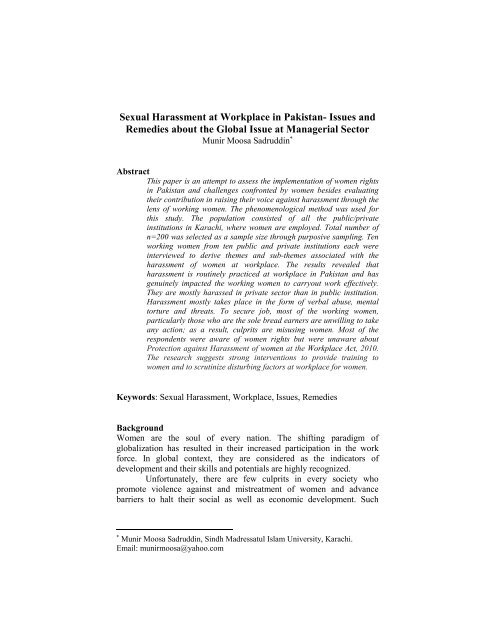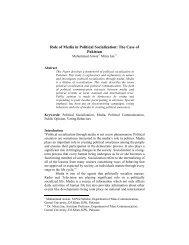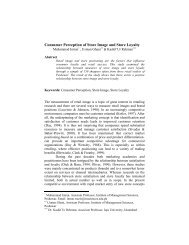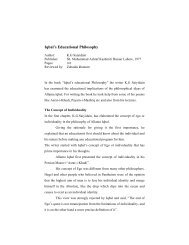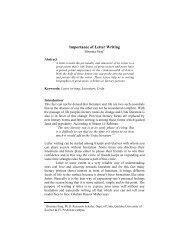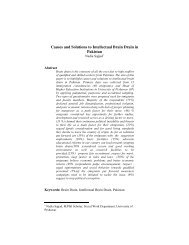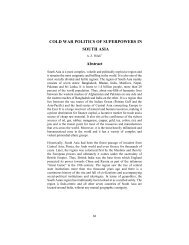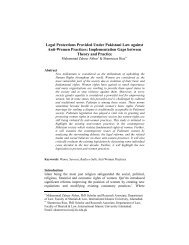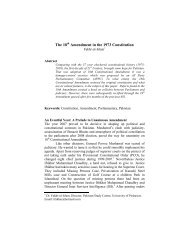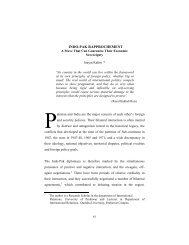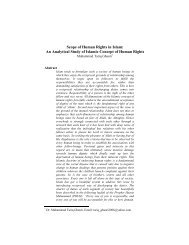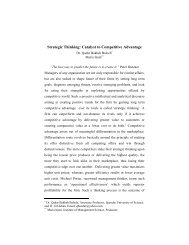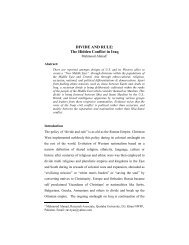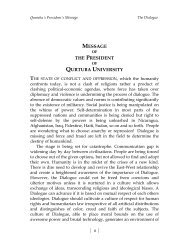Sexual Harassment at Workplace in Pakistan - Qurtuba University of ...
Sexual Harassment at Workplace in Pakistan - Qurtuba University of ...
Sexual Harassment at Workplace in Pakistan - Qurtuba University of ...
Create successful ePaper yourself
Turn your PDF publications into a flip-book with our unique Google optimized e-Paper software.
<strong>Sexual</strong> <strong>Harassment</strong> <strong>at</strong> <strong>Workplace</strong> <strong>in</strong> <strong>Pakistan</strong>- Issues and<br />
Remedies about the Global Issue <strong>at</strong> Managerial Sector<br />
Munir Moosa Sadrudd<strong>in</strong> ∗<br />
Abstract<br />
This paper is an <strong>at</strong>tempt to assess the implement<strong>at</strong>ion <strong>of</strong> women rights<br />
<strong>in</strong> <strong>Pakistan</strong> and challenges confronted by women besides evalu<strong>at</strong><strong>in</strong>g<br />
their contribution <strong>in</strong> rais<strong>in</strong>g their voice aga<strong>in</strong>st harassment through the<br />
lens <strong>of</strong> work<strong>in</strong>g women. The phenomenological method was used for<br />
this study. The popul<strong>at</strong>ion consisted <strong>of</strong> all the public/priv<strong>at</strong>e<br />
<strong>in</strong>stitutions <strong>in</strong> Karachi, where women are employed. Total number <strong>of</strong><br />
n=200 was selected as a sample size through purposive sampl<strong>in</strong>g. Ten<br />
work<strong>in</strong>g women from ten public and priv<strong>at</strong>e <strong>in</strong>stitutions each were<br />
<strong>in</strong>terviewed to derive themes and sub-themes associ<strong>at</strong>ed with the<br />
harassment <strong>of</strong> women <strong>at</strong> workplace. The results revealed th<strong>at</strong><br />
harassment is rout<strong>in</strong>ely practiced <strong>at</strong> workplace <strong>in</strong> <strong>Pakistan</strong> and has<br />
genu<strong>in</strong>ely impacted the work<strong>in</strong>g women to carryout work effectively.<br />
They are mostly harassed <strong>in</strong> priv<strong>at</strong>e sector than <strong>in</strong> public <strong>in</strong>stitution.<br />
<strong>Harassment</strong> mostly takes place <strong>in</strong> the form <strong>of</strong> verbal abuse, mental<br />
torture and thre<strong>at</strong>s. To secure job, most <strong>of</strong> the work<strong>in</strong>g women,<br />
particularly those who are the sole bread earners are unwill<strong>in</strong>g to take<br />
any action; as a result, culprits are misus<strong>in</strong>g women. Most <strong>of</strong> the<br />
respondents were aware <strong>of</strong> women rights but were unaware about<br />
Protection aga<strong>in</strong>st <strong>Harassment</strong> <strong>of</strong> women <strong>at</strong> the <strong>Workplace</strong> Act, 2010.<br />
The research suggests strong <strong>in</strong>terventions to provide tra<strong>in</strong><strong>in</strong>g to<br />
women and to scrut<strong>in</strong>ize disturb<strong>in</strong>g factors <strong>at</strong> workplace for women.<br />
Keywords: <strong>Sexual</strong> <strong>Harassment</strong>, <strong>Workplace</strong>, Issues, Remedies<br />
Background<br />
Women are the soul <strong>of</strong> every n<strong>at</strong>ion. The shift<strong>in</strong>g paradigm <strong>of</strong><br />
globaliz<strong>at</strong>ion has resulted <strong>in</strong> their <strong>in</strong>creased particip<strong>at</strong>ion <strong>in</strong> the work<br />
force. In global context, they are considered as the <strong>in</strong>dic<strong>at</strong>ors <strong>of</strong><br />
development and their skills and potentials are highly recognized.<br />
Unfortun<strong>at</strong>ely, there are few culprits <strong>in</strong> every society who<br />
promote violence aga<strong>in</strong>st and mistre<strong>at</strong>ment <strong>of</strong> women and advance<br />
barriers to halt their social as well as economic development. Such<br />
∗ Munir Moosa Sadrudd<strong>in</strong>, S<strong>in</strong>dh Madress<strong>at</strong>ul Islam <strong>University</strong>, Karachi.<br />
Email: munirmoosa@yahoo.com
<strong>Sexual</strong> <strong>Harassment</strong> <strong>at</strong> <strong>Workplace</strong> <strong>in</strong> <strong>Pakistan</strong>:<br />
Issues and Remedies about the Global Issue <strong>at</strong> Managerial Sector<br />
Munir Moosa<br />
violence when touches the boundary <strong>of</strong> workplace where educ<strong>at</strong>ed<br />
people are employed, raises the brows <strong>of</strong> <strong>in</strong>tellectual tanks.<br />
<strong>Harassment</strong> is one <strong>of</strong> the serious unreasonable & reprehensible<br />
conducts which are rout<strong>in</strong>ely practiced <strong>at</strong> many workplaces. Though this<br />
reveal<strong>in</strong>g truth is bitter to be absorbed, yet it is the reflection <strong>of</strong> the<br />
current st<strong>at</strong>e <strong>of</strong> work<strong>in</strong>g women <strong>in</strong> the world.<br />
United N<strong>at</strong>ions def<strong>in</strong>es harassment as a k<strong>in</strong>d <strong>of</strong> behaviour<br />
(verbal or physical) th<strong>at</strong> h<strong>in</strong>ders work or promote <strong>of</strong>fensive work<br />
environment (UN, n.d.). One <strong>of</strong> the most common types <strong>of</strong> harassment is<br />
sexual harassment which is def<strong>in</strong>ed as an unethical code <strong>of</strong> conduct<br />
which a woman f<strong>in</strong>ds thre<strong>at</strong>en<strong>in</strong>g or <strong>of</strong>fensive (Goonesekere, 2004). This<br />
unwanted sex-rel<strong>at</strong>ed behavior (Fitzgerald, Swan, & Magley, 1997) and<br />
conceal<strong>in</strong>g phenomena is the part and parcel <strong>of</strong> all occup<strong>at</strong>ions and<br />
<strong>in</strong>dustries (Hunt, Davidson, Fielden & Hoel, 2007). It could be <strong>in</strong> the<br />
form <strong>of</strong> gender harassment (e.g., verbal/nonverbal behavior abuse); or<br />
unethical act for ga<strong>in</strong><strong>in</strong>g <strong>at</strong>tention (e.g., touch<strong>in</strong>g, call<strong>in</strong>g); or sexual<br />
coercion (e.g., sexual bribes or thre<strong>at</strong>s) (Fitzgerald, Gelfand, & Drasgow,<br />
1995).<br />
We cannot refute this fact th<strong>at</strong> the empowered women are strong,<br />
but <strong>at</strong> workplace, if they face sexual harassment, many factors make<br />
them reluctant to make alleg<strong>at</strong>ions aga<strong>in</strong>st the culprits which <strong>in</strong>clude fear<br />
<strong>of</strong> los<strong>in</strong>g their jobs… and embarrassment or shame <strong>at</strong> be<strong>in</strong>g harassed.<br />
A research was carried out <strong>in</strong> Europe estim<strong>at</strong>es th<strong>at</strong> up to 50% <strong>of</strong><br />
female employees <strong>in</strong> European Union countries have experienced sexual<br />
harassment (UNISON, 2008). Unfortun<strong>at</strong>ely, evidence towards sexual<br />
harassment <strong>at</strong> workplace <strong>in</strong> Asian countries are not well documented but<br />
<strong>in</strong> many Asian countries, harassment is be<strong>in</strong>g practiced which can be<br />
evalu<strong>at</strong>ed through the steps taken by many Asian countries to<br />
<strong>in</strong>stitutionalize ways <strong>of</strong> deal<strong>in</strong>g with the problem. In 1995, the<br />
Philipp<strong>in</strong>es passed an Anti-<strong>Sexual</strong> <strong>Harassment</strong> Act which promoted zerotolerance<br />
for workplace sexual harassment (ILO, n.d.). Thailand<br />
amended its Labour Code <strong>in</strong> 1998 to <strong>in</strong>clude penalties for sexual<br />
viol<strong>at</strong>ions <strong>at</strong> workplace (ILO NATLEX, n.d.). Similarly, Malaysia and<br />
other Asian countries passed several bills to provide secure workplace<br />
environment to women <strong>in</strong> <strong>Pakistan</strong>, a report <strong>of</strong> the Commission on<br />
Inquiry for Women <strong>in</strong> <strong>Pakistan</strong> recognized th<strong>at</strong> sexual harassment <strong>in</strong> the<br />
workplace does take place <strong>in</strong> <strong>Pakistan</strong> (Malla, n.d.). Accord<strong>in</strong>g to<br />
Parveen (2010), a total 24119 <strong>of</strong> violence aga<strong>in</strong>st women cases were<br />
reported <strong>in</strong> <strong>Pakistan</strong> dur<strong>in</strong>g 2008-10 among <strong>of</strong> which only 520 workplace<br />
harassment cases were filed. Beside th<strong>at</strong> the newspapers and electronic<br />
media portray few cases <strong>of</strong> sexual harassment <strong>at</strong> workplace, which show<br />
th<strong>at</strong> the work place <strong>in</strong> <strong>Pakistan</strong> is not safe for women. Keep<strong>in</strong>g <strong>in</strong> view<br />
the recent and past <strong>in</strong>cidents, government passed The Protection aga<strong>in</strong>st<br />
Journal <strong>of</strong> Managerial Sciences 114<br />
Volume VII Number 1
<strong>Sexual</strong> <strong>Harassment</strong> <strong>at</strong> <strong>Workplace</strong> <strong>in</strong> <strong>Pakistan</strong>:<br />
Issues and Remedies about the Global Issue <strong>at</strong> Managerial Sector<br />
Munir Moosa<br />
<strong>Harassment</strong> <strong>of</strong> Women <strong>at</strong> <strong>Workplace</strong> Bill <strong>in</strong> 2010 <strong>in</strong> order to provide safe<br />
and sound environment to the work<strong>in</strong>g women. Turn<strong>in</strong>g the bill <strong>in</strong>to a<br />
law was a big step but unfortun<strong>at</strong>ely, the law served as a piece <strong>of</strong> paper.<br />
It was assumed th<strong>at</strong> a male culprit would th<strong>in</strong>k million times before<br />
harass<strong>in</strong>g any women, but all laws fell fl<strong>at</strong>. <strong>Pakistan</strong> is also sign<strong>at</strong>ory to<br />
few Intern<strong>at</strong>ional documents to advoc<strong>at</strong>e women rights <strong>at</strong> every pl<strong>at</strong>form<br />
but the element <strong>of</strong> practical implement<strong>at</strong>ion <strong>of</strong> rights are miss<strong>in</strong>g.<br />
This research will try to extract some realities <strong>of</strong> harassment <strong>at</strong><br />
workplace <strong>in</strong> <strong>Pakistan</strong> through the enriched experiences <strong>of</strong> work<strong>in</strong>g<br />
women.<br />
Research Objectives<br />
• To assess the challenges confronted by women <strong>at</strong> work place<br />
• To evalu<strong>at</strong>e the types <strong>of</strong> harassment women faces <strong>at</strong> workplace<br />
• To understand the <strong>in</strong>form<strong>at</strong>ion or awareness level <strong>of</strong> women<br />
about their rights and their contribution <strong>in</strong> rais<strong>in</strong>g their voice<br />
aga<strong>in</strong>st harassment<br />
Research Question<br />
• Is sexual harassment practiced <strong>at</strong> workplace <strong>in</strong> <strong>Pakistan</strong>?<br />
Subsidiary Question<br />
• Are respondents familiar with the term harassment?<br />
• Wh<strong>at</strong> are the views <strong>of</strong> respondents about the commencement <strong>of</strong><br />
harassment <strong>at</strong> workplace?<br />
• Are respondents tra<strong>in</strong>ed to tackle such situ<strong>at</strong>ions?<br />
• Are respondents aware <strong>of</strong> their rights?<br />
Research Design<br />
The phenomenological method is used for this study. The ma<strong>in</strong> focus <strong>of</strong><br />
the phenomenological researcher is to see th<strong>in</strong>gs from the lens <strong>of</strong><br />
experienced people and for ga<strong>in</strong><strong>in</strong>g <strong>in</strong>sight <strong>in</strong>to the essence (Rose et al<br />
1995) and to provide rich textured description <strong>of</strong> lived experience.<br />
Sample & Method<br />
The popul<strong>at</strong>ion consisted <strong>of</strong> all the public/priv<strong>at</strong>e <strong>in</strong>stitutions <strong>in</strong> Karachi,<br />
where women are employed. Total number <strong>of</strong> n=200 was selected as a<br />
sample size through purposive sampl<strong>in</strong>g. Ten work<strong>in</strong>g women from ten<br />
public and ten priv<strong>at</strong>e <strong>in</strong>stitutions were <strong>in</strong>terviewed to derive themes and<br />
sub-themes associ<strong>at</strong>ed with the harassment <strong>of</strong> women <strong>at</strong> workplace.<br />
Journal <strong>of</strong> Managerial Sciences 115<br />
Volume VII Number 1
<strong>Sexual</strong> <strong>Harassment</strong> <strong>at</strong> <strong>Workplace</strong> <strong>in</strong> <strong>Pakistan</strong>:<br />
Issues and Remedies about the Global Issue <strong>at</strong> Managerial Sector<br />
Munir Moosa<br />
Analysis<br />
<strong>Harassment</strong> <strong>at</strong> workplace is a social stigma which promotes unhealthy<br />
environment.<br />
As much as sexual harassment is <strong>in</strong>creas<strong>in</strong>g day by day <strong>at</strong><br />
workplaces <strong>in</strong> <strong>Pakistan</strong>, it is taken less leniently as ever.<br />
The respondents for this particular research were work<strong>in</strong>g <strong>in</strong><br />
banks, mult<strong>in</strong><strong>at</strong>ional companies, government sectors, educ<strong>at</strong>ional<br />
<strong>in</strong>stitutions, advertisement agencies and media. When the respondents<br />
were asked if they are familiar to the work harassment, all the<br />
respondents (100%) agreed which show th<strong>at</strong> the work<strong>in</strong>g women <strong>in</strong><br />
<strong>Pakistan</strong> (both <strong>in</strong> public and priv<strong>at</strong>e sector) are familiar to the word<br />
‘harassment’. Most <strong>of</strong> the respondents believed th<strong>at</strong> harassment is mostly<br />
the reflection <strong>of</strong> gender biasness and racial discrim<strong>in</strong><strong>at</strong>ion, and such<br />
uncomfortable act upset and mentally assault <strong>in</strong>dividuals and sometimes,<br />
even causes psycho-som<strong>at</strong>ic disorders.<br />
The trend <strong>of</strong> gender <strong>in</strong>equality is very common <strong>in</strong> South Asian<br />
societies, where women are mostly marg<strong>in</strong>alized and considered least<br />
important <strong>in</strong> decision mak<strong>in</strong>g process. This gender <strong>in</strong>equality is deemed<br />
as one <strong>of</strong> the lead<strong>in</strong>g factors <strong>of</strong> violence aga<strong>in</strong>st women (UNFPA-<br />
AFPPD, 2003). Sociologists co-rel<strong>at</strong>e sexual harassment with workplace<br />
<strong>in</strong>equalities or gender <strong>in</strong>equalities and other k<strong>in</strong>ds <strong>of</strong> discrim<strong>in</strong><strong>at</strong>ions<br />
rel<strong>at</strong>ed to workplace (Lopez, Hodson, & Roscigno, 2009). Unfortun<strong>at</strong>ely,<br />
society does not value woman and unwelcom<strong>in</strong>g act makes female<br />
uncomfortable. Ma<strong>in</strong>ta<strong>in</strong><strong>in</strong>g physical distance comes under the norms<br />
and ethics <strong>of</strong> organiz<strong>at</strong>ion but the culprits does not value these key<br />
ethical consider<strong>at</strong>ions.<br />
One <strong>of</strong> the respondents shared:<br />
“<strong>Harassment</strong> is a form <strong>of</strong> abuse th<strong>at</strong> affects one’s performance <strong>at</strong> work<br />
adversely, due to another person’s <strong>in</strong>appropri<strong>at</strong>e behaviour. It disturbs<br />
<strong>in</strong>dividuals (mentally and physically) dur<strong>in</strong>g the course <strong>of</strong> his work<br />
performance.”<br />
The respondents are <strong>in</strong> view th<strong>at</strong> harassment is <strong>in</strong>tentional and could be<br />
<strong>in</strong> the form <strong>of</strong> sexual, mental or emotional abuse. Gestures and unethical<br />
words are the common tre<strong>at</strong> through which harassment is <strong>of</strong>ten promoted<br />
<strong>at</strong> workplace. All the respondents found it disturb<strong>in</strong>g as well as<br />
thre<strong>at</strong>en<strong>in</strong>g <strong>at</strong> times as the dignity <strong>of</strong> a person is <strong>in</strong>vaded through this<br />
k<strong>in</strong>d <strong>of</strong> act which eventually promote unhealthy environment.<br />
Another respondent said:<br />
“<strong>Harassment</strong> means any unwelcome sexual advance, aggressive<br />
demand for sexual favors or other verbal or written communic<strong>at</strong>ion or<br />
physical conduct <strong>of</strong> a sexual n<strong>at</strong>ure or sexually demean<strong>in</strong>g <strong>at</strong>titudes,<br />
caus<strong>in</strong>g <strong>in</strong>terference with work performance or cre<strong>at</strong><strong>in</strong>g an<br />
<strong>in</strong>timid<strong>at</strong><strong>in</strong>g, hostile or <strong>of</strong>fensive work environment, or the <strong>at</strong>tempt to<br />
Journal <strong>of</strong> Managerial Sciences 116<br />
Volume VII Number 1
<strong>Sexual</strong> <strong>Harassment</strong> <strong>at</strong> <strong>Workplace</strong> <strong>in</strong> <strong>Pakistan</strong>:<br />
Issues and Remedies about the Global Issue <strong>at</strong> Managerial Sector<br />
Munir Moosa<br />
punish the compla<strong>in</strong>ant for refusal to comply to such a request or is<br />
made a condition for employment.”<br />
When they were asked if they agree th<strong>at</strong> sexual harassment takes place <strong>at</strong><br />
workplace, 100% respondents agreed. Through the <strong>in</strong>terviews, a<br />
shock<strong>in</strong>g phenomenon was derived th<strong>at</strong> it mostly takes place <strong>at</strong> priv<strong>at</strong>e<br />
<strong>in</strong>stitutions than <strong>in</strong> public <strong>in</strong>stitutions.<br />
One <strong>of</strong> the respondents said:<br />
“It does take place everywhere <strong>in</strong>clud<strong>in</strong>g <strong>of</strong>fice environments where<br />
females are <strong>in</strong> m<strong>in</strong>ority and are work<strong>in</strong>g shoulder to shoulder <strong>in</strong><br />
perform<strong>in</strong>g their job responsibilities. Females cont<strong>in</strong>ue to suffer <strong>in</strong> our<br />
hostile lawlessness environment due to lack <strong>of</strong> organiz<strong>at</strong>ional policies<br />
and human resources.”<br />
One <strong>of</strong> the respondents disagrees and shared the follow<strong>in</strong>g words:<br />
“It is you who makes your own environment. I work with men but not<br />
even a s<strong>in</strong>gle man ever teases me because I am empowered and I know<br />
my boundaries. Unless a person show her weakness, it is not likely to<br />
take place <strong>at</strong> any workplace.”<br />
Another respondent shared her views about the self will <strong>of</strong> women:<br />
“It happens a lot <strong>in</strong> our context, particularly because men th<strong>in</strong>k th<strong>at</strong><br />
the work<strong>in</strong>g women “need” their jobs so they can do anyth<strong>in</strong>g they like<br />
and get away with it. Women must learn to say no and to protect and<br />
defence their own selves.”<br />
There are many types <strong>of</strong> harassment women faces <strong>at</strong> workplace. The<br />
follow<strong>in</strong>g are the list <strong>of</strong> most commonly gestures use for sexual<br />
harassment shared by the respondents <strong>in</strong>clude gaz<strong>in</strong>g, touch<strong>in</strong>g, bully<strong>in</strong>g,<br />
unwanted jokes and dialogues, gender bias, <strong>in</strong>timid<strong>at</strong>ion, verbal <strong>in</strong>sult,<br />
giv<strong>in</strong>g lift, plac<strong>in</strong>g arms on the shoulders, touch<strong>in</strong>g <strong>of</strong> hips, <strong>in</strong>decent<br />
body language, marg<strong>in</strong>aliz<strong>in</strong>g women, neg<strong>at</strong>ive emails, show<strong>in</strong>g porn<br />
movies.<br />
One <strong>of</strong> the respondents shared bitter reality:<br />
“My boss asked me th<strong>at</strong> I have to sit for l<strong>at</strong>e to complete the<br />
assignment. He called me to his cab<strong>in</strong> and asked me to wait. L<strong>at</strong>er he<br />
tried to show me a porn movie and apologize me th<strong>at</strong> it was opened by<br />
mistake. L<strong>at</strong>er he started rubb<strong>in</strong>g his ma<strong>in</strong> part, which gave me the<br />
sign th<strong>at</strong> his <strong>in</strong>tentions were bad. I ran away, and r<strong>at</strong>her leav<strong>in</strong>g job, I<br />
compla<strong>in</strong>ed police and he was penalized.”<br />
Another respondent shared her past experience:<br />
“In one <strong>of</strong> the organiz<strong>at</strong>ion, where I was work<strong>in</strong>g <strong>in</strong> the past, the<br />
manager <strong>of</strong> the unit <strong>of</strong>fice was misus<strong>in</strong>g the female employees while we<br />
Journal <strong>of</strong> Managerial Sciences 117<br />
Volume VII Number 1
<strong>Sexual</strong> <strong>Harassment</strong> <strong>at</strong> <strong>Workplace</strong> <strong>in</strong> <strong>Pakistan</strong>:<br />
Issues and Remedies about the Global Issue <strong>at</strong> Managerial Sector<br />
Munir Moosa<br />
all were quiet and did not take any action. I also preferred to leave th<strong>at</strong><br />
job.”<br />
The respondents were asked if they or any <strong>of</strong> their colleagues ever faced<br />
any sort <strong>of</strong> harassment and wh<strong>at</strong> was the n<strong>at</strong>ure <strong>of</strong> th<strong>at</strong> harassment,<br />
mostly agreed. Most <strong>of</strong> them did not share whether they were victimized<br />
or not, however 96% <strong>of</strong> the respondents agreed th<strong>at</strong> either they or their<br />
colleagues faced harassment. One <strong>of</strong> the respondents said:<br />
“Mostly guys and senior management used to tease girls on the dress<br />
code and passed racist jokes <strong>at</strong> my workplace.”<br />
One <strong>of</strong> the respondents shared disturb<strong>in</strong>g element <strong>of</strong> racial harassment:<br />
“I was racially discrim<strong>in</strong><strong>at</strong>ed. One <strong>of</strong> my bosses played a blame game<br />
with me and tried to label me black. I wanted to slap him but I can’t<br />
because th<strong>at</strong> would worsen the situ<strong>at</strong>ion.”<br />
Another respondent said:<br />
“One <strong>of</strong> my colleagues who work <strong>in</strong> the <strong>in</strong>dustrial sector always faces<br />
harassment. Many men try to look deep <strong>in</strong>to her neck and make fun <strong>of</strong><br />
me when they sit with other boy’s gang.”<br />
Another respondent shared experience:<br />
“Many years ago, my friend’s boss tried to grab her but when he<br />
realized th<strong>at</strong> she wasn’t go<strong>in</strong>g to cooper<strong>at</strong>e him, he just fired her on<br />
the pretext th<strong>at</strong> her work wasn’t s<strong>at</strong>isfactory.”<br />
<strong>Sexual</strong> harassment is commonly practised by seniors or boss because <strong>of</strong><br />
their power and st<strong>at</strong>us, particularly when the female employees are either<br />
weak or employed <strong>at</strong> a junior post. Through the <strong>in</strong>terviews it was derived<br />
th<strong>at</strong> boss or senior management staff take such bold step by thre<strong>at</strong>en<strong>in</strong>g<br />
or <strong>of</strong>fer<strong>in</strong>g lucr<strong>at</strong>ive <strong>of</strong>fers.<br />
Willness, Steel, and Lee (2007) have viewed th<strong>at</strong> most <strong>of</strong> the<br />
time; sexual harassment badly affects the job performance. Despite <strong>of</strong><br />
modernism and open-m<strong>in</strong>dedness, workers still are gett<strong>in</strong>g harassed and<br />
due to which lack <strong>of</strong> effectiveness on job performance is seen <strong>in</strong><br />
<strong>Pakistan</strong>. The present research has somehow proved this phenomenon<br />
with the results where the employees were openly harassed by their<br />
supervisors with the perception to cont<strong>in</strong>ue their jobs. Some <strong>of</strong> the<br />
respondents compla<strong>in</strong>ed <strong>of</strong> mentally disturbed environment which<br />
affected their job performance.<br />
One <strong>of</strong> the respondents shared traum<strong>at</strong>ic situ<strong>at</strong>ion faced by her<br />
friend which show to correl<strong>at</strong>ion <strong>of</strong> sexual harassment <strong>at</strong> workplace with<br />
mental disturbance:<br />
Journal <strong>of</strong> Managerial Sciences 118<br />
Volume VII Number 1
<strong>Sexual</strong> <strong>Harassment</strong> <strong>at</strong> <strong>Workplace</strong> <strong>in</strong> <strong>Pakistan</strong>:<br />
Issues and Remedies about the Global Issue <strong>at</strong> Managerial Sector<br />
Munir Moosa<br />
“My friend got sick and was rest<strong>in</strong>g <strong>in</strong> a rest room. She was all alone.<br />
The boss tried to s<strong>at</strong> beside her and make her comfortable by his<br />
convers<strong>at</strong>ion. Suddenly, he held her very tightly and kissed her cheeks.<br />
She was helpless and unable to move because <strong>of</strong> harsh hold<strong>in</strong>g. After<br />
th<strong>at</strong>, he touched her breast very badly and then she pushed him with<br />
full force and ran <strong>of</strong>f.”<br />
Women <strong>in</strong> <strong>Pakistan</strong> should always accompany other female or <strong>in</strong>form<br />
colleagues dur<strong>in</strong>g extra hours <strong>of</strong> work<strong>in</strong>g and avoid sitt<strong>in</strong>g for l<strong>at</strong>e hours<br />
<strong>in</strong> the absence <strong>of</strong> other staff.<br />
When the respondents were asked which tactics they use to tackle the<br />
situ<strong>at</strong>ion, majority believed th<strong>at</strong> compla<strong>in</strong><strong>in</strong>g or ignor<strong>in</strong>g is the best<br />
possible solution. Follow<strong>in</strong>g were the important themes derived from the<br />
responses<br />
• Compla<strong>in</strong> the adm<strong>in</strong>istr<strong>at</strong>or<br />
• Ignor<strong>in</strong>g<br />
• Resign<strong>at</strong>ion<br />
• Stress Management Tra<strong>in</strong><strong>in</strong>g<br />
• Peaceful Dialogue with HR<br />
• Kick the sensitive part <strong>of</strong> th<strong>at</strong> person<br />
• Scream hard<br />
• Go straight to the parents or wife <strong>of</strong> th<strong>at</strong> man to compla<strong>in</strong><br />
One <strong>of</strong> the respondents shared her distress situ<strong>at</strong>ion:<br />
“There was noth<strong>in</strong>g much th<strong>at</strong> could be done because even when some<br />
<strong>of</strong> us compla<strong>in</strong>ed it was tre<strong>at</strong>ed as be<strong>in</strong>g arrogant, accus<strong>in</strong>g or<br />
exploit<strong>at</strong>ive by the guilty party, which sadly was always accepted by<br />
the senior management r<strong>at</strong>her than ask for details or believe the<br />
compla<strong>in</strong>t raiser.”<br />
Many <strong>of</strong> the respondents believed th<strong>at</strong> tak<strong>in</strong>g action aga<strong>in</strong>st the culprit is<br />
equal to los<strong>in</strong>g job. One shared:<br />
“My friend compla<strong>in</strong>ed the boss about be<strong>in</strong>g harassed. The boss fired<br />
me to secure the image <strong>of</strong> organiz<strong>at</strong>ion”.<br />
This unreported act usually motiv<strong>at</strong>es the <strong>of</strong>fender to cont<strong>in</strong>ue the<br />
<strong>of</strong>fensive behavior (H<strong>of</strong>fman, Haml<strong>in</strong>, 2002). Ali (2010) mentioned:<br />
“<strong>Pakistan</strong>i women generally go through three different levels <strong>of</strong> issues<br />
with<strong>in</strong> SH (sexual harassment) process. Firstly, women endeavor to<br />
hide SH due to Islamic modesty and cultural traditions. Secondly, once<br />
they decide to take action there is a lack <strong>of</strong> redress <strong>at</strong> organiz<strong>at</strong>ional<br />
and government level. F<strong>in</strong>ally, once they report the issue they face<br />
victimiz<strong>at</strong>ion.”<br />
Journal <strong>of</strong> Managerial Sciences 119<br />
Volume VII Number 1
<strong>Sexual</strong> <strong>Harassment</strong> <strong>at</strong> <strong>Workplace</strong> <strong>in</strong> <strong>Pakistan</strong>:<br />
Issues and Remedies about the Global Issue <strong>at</strong> Managerial Sector<br />
Munir Moosa<br />
However, there were few respondents who shared their dar<strong>in</strong>g act to deal<br />
with such situ<strong>at</strong>ion:<br />
“When this happened to my friend, <strong>at</strong> first she was speechless but<br />
r<strong>at</strong>her keep<strong>in</strong>g silence, she shared this tragedy with few reliable and<br />
trust worthy colleagues. With their help she recorded his voice very<br />
cleverly. Then we forced the culprit to accept the mistake. Initially th<strong>at</strong><br />
person was deny<strong>in</strong>g but afterward, he accepted. She also submitted the<br />
record<strong>in</strong>gs to the boss. Th<strong>at</strong> man was f<strong>in</strong>ally dismissed from the job.”<br />
The respondents shared th<strong>at</strong> most <strong>of</strong> the women avoid shar<strong>in</strong>g their<br />
concern to discuss this problem to others, particularly to the head. Many<br />
reasons are beh<strong>in</strong>d this bar. Few <strong>of</strong> them are afraid <strong>of</strong> consequences<br />
aga<strong>in</strong>st women, societal pressure, fear <strong>of</strong> Insult and thre<strong>at</strong>, position<br />
power, and job security<br />
Such traits provoke sexual harassment as fear <strong>of</strong> los<strong>in</strong>g the job<br />
upon fil<strong>in</strong>g the compla<strong>in</strong>t (Björkqvist, Österman, & Hjelt-Bäck, 1994) is<br />
the weakest sign <strong>of</strong> <strong>in</strong>vit<strong>in</strong>g sexual harassment.<br />
One <strong>of</strong> the respondents said:<br />
“Women are never given rights to fight for themselves s<strong>in</strong>ce birth. Due<br />
to fear, anxiety and work depression, many <strong>of</strong> the women decides to<br />
stay silent and do not protest because nobody will listen.”<br />
Another respondent shared:<br />
“As far as my experience is concerned, women never raised their<br />
voices. There might be certa<strong>in</strong> reasons like f<strong>in</strong>ancial problem, feel<strong>in</strong>g<br />
shyness, fear <strong>of</strong> los<strong>in</strong>g job, sensitivity, feel<strong>in</strong>g <strong>of</strong> destroy<strong>in</strong>g her image<br />
and reput<strong>at</strong>ion <strong>in</strong> front <strong>of</strong> their colleagues, fear people mock her, fear<br />
<strong>of</strong> thre<strong>at</strong>en<strong>in</strong>g and many more. I personally feel th<strong>at</strong> women should<br />
have to have raised voice and take action aga<strong>in</strong>st abuser <strong>of</strong> any k<strong>in</strong>d <strong>of</strong><br />
verbal, physical, mental, religious or emotional harassment before it<br />
would get vulnerable. It is the right <strong>of</strong> every women to fight aga<strong>in</strong>st<br />
such abuser so they would be conscious and fearful and must th<strong>in</strong>k th<strong>at</strong><br />
women are also powerful than men. Now here question arises th<strong>at</strong>s<br />
why always women become the morsel <strong>of</strong> abuser? Why women toler<strong>at</strong>e<br />
such shameful act <strong>of</strong> the opposite gender? There is dire need to raises<br />
their voices. Her little action makes the difference and spread<br />
awareness to the numerous people <strong>of</strong> the society where males are<br />
always dom<strong>in</strong>ant and females considered [supprressed].”<br />
Other respondent said:<br />
“If the n<strong>at</strong>ure <strong>of</strong> harassment is physical or sexual, they don’t compla<strong>in</strong><br />
so they don’t become a topic for gossip <strong>at</strong> workplace. In case <strong>of</strong><br />
marg<strong>in</strong>aliz<strong>at</strong>ion, most women don’t claim an equal right as their peers<br />
for fear <strong>of</strong> los<strong>in</strong>g their jobs as we are liv<strong>in</strong>g <strong>in</strong> a p<strong>at</strong>riarchal society.”<br />
Journal <strong>of</strong> Managerial Sciences 120<br />
Volume VII Number 1
<strong>Sexual</strong> <strong>Harassment</strong> <strong>at</strong> <strong>Workplace</strong> <strong>in</strong> <strong>Pakistan</strong>:<br />
Issues and Remedies about the Global Issue <strong>at</strong> Managerial Sector<br />
Munir Moosa<br />
Another respondent shared:<br />
“Many women raise their voice about <strong>Harassment</strong>. The woman who<br />
fails to do so is ma<strong>in</strong>ly because <strong>of</strong> the consequences <strong>of</strong> rais<strong>in</strong>g voice.<br />
Usually the conclusion <strong>of</strong> such situ<strong>at</strong>ion is resign<strong>at</strong>ion from current<br />
work place.”<br />
S<strong>in</strong>ce there is a neg<strong>at</strong>ive <strong>at</strong>titude <strong>of</strong> people <strong>in</strong> many cultural sett<strong>in</strong>gs<br />
with<strong>in</strong> <strong>Pakistan</strong> towards work<strong>in</strong>g <strong>of</strong> women, the work<strong>in</strong>g women mostly<br />
f<strong>in</strong>d it easy to keep quiet to avoid los<strong>in</strong>g job.<br />
When the respondents were asked wh<strong>at</strong> have they done to raise<br />
awareness aga<strong>in</strong>st harassment or will do, majority said th<strong>at</strong> they did<br />
noth<strong>in</strong>g however few <strong>of</strong> the respondents said th<strong>at</strong> they arranged<br />
workshops, sem<strong>in</strong>ars, tra<strong>in</strong><strong>in</strong>gs, to empower women. One <strong>of</strong> the<br />
respondents also shared th<strong>at</strong> they requested the head to make harassment<br />
policies which were recently f<strong>in</strong>alized by their organiz<strong>at</strong>ion. Avoid<strong>in</strong>g<br />
such situ<strong>at</strong>ion is not healthy however few said th<strong>at</strong> they prefer ignor<strong>in</strong>g<br />
such situ<strong>at</strong>ion. Other responses <strong>in</strong>clude compla<strong>in</strong> to management, blunt<br />
and straightforward, counsell<strong>in</strong>g, learn to say no, don’t allow the male<br />
member to visit your <strong>of</strong>fice unnecessarily, punish by humili<strong>at</strong><strong>in</strong>g, avoid<br />
sitt<strong>in</strong>g for l<strong>at</strong>e hours, talk to other women colleague, rais<strong>in</strong>g awareness<br />
through media.<br />
One respondent said:<br />
“I am very vocal about harassment <strong>at</strong> work places and always orient<br />
my program <strong>of</strong>ficers and subord<strong>in</strong><strong>at</strong>es about how important it is to be<br />
aware <strong>of</strong> wh<strong>at</strong> harassment is and never to let someone do it to the<br />
issue.”<br />
One <strong>of</strong> the respondents said:<br />
“First <strong>of</strong> all I scrut<strong>in</strong>ize organiz<strong>at</strong>ional policy and gauge the st<strong>at</strong>us <strong>of</strong><br />
the person who does so, <strong>in</strong> terms <strong>of</strong> authority. Second I put my case<br />
first verbally by discuss<strong>in</strong>g responsible person and then <strong>in</strong> writ<strong>in</strong>g. If I<br />
wasn’t considered then I shout (with politeness and they don’t respond<br />
because they know they are guilty) even on bosses. This is very<br />
common <strong>in</strong> priv<strong>at</strong>e organiz<strong>at</strong>ion especially <strong>in</strong> educ<strong>at</strong>ional.”<br />
Tak<strong>in</strong>g bold step after tak<strong>in</strong>g other employees <strong>in</strong>to confidence is the best<br />
possible solution than zipp<strong>in</strong>g lips. Unless women are empowered with<br />
tra<strong>in</strong><strong>in</strong>g and develop confidence, sexual harassment may cont<strong>in</strong>ue to<br />
prevail <strong>in</strong> <strong>Pakistan</strong> society.<br />
When the respondents were asked about women rights, all shared<br />
their awareness through shar<strong>in</strong>g their views. The rights derived from the<br />
<strong>in</strong>terviews are:<br />
Journal <strong>of</strong> Managerial Sciences 121<br />
Volume VII Number 1
<strong>Sexual</strong> <strong>Harassment</strong> <strong>at</strong> <strong>Workplace</strong> <strong>in</strong> <strong>Pakistan</strong>:<br />
Issues and Remedies about the Global Issue <strong>at</strong> Managerial Sector<br />
Munir Moosa<br />
Right to Equality<br />
Eight to be Tre<strong>at</strong>ed Fairly<br />
Right to fought for their rights<br />
Right to be a Women<br />
Right to Employment<br />
Right to Speak<br />
Right to be Respected<br />
Right to Employment<br />
Opportunity<br />
Right to Work<br />
Right to Protest<br />
Right to Security<br />
Right to Negoti<strong>at</strong>e<br />
Right to Equal Opportunities<br />
Right to save Work Environment<br />
Right to speak aga<strong>in</strong>st violence<br />
The women knew about their rights and still faced/experienced sexual<br />
harassment <strong>at</strong> workplace because <strong>of</strong> many underly<strong>in</strong>g issues. One <strong>of</strong> the<br />
reasons may be the generaliz<strong>at</strong>ion <strong>of</strong> women rights. In <strong>Pakistan</strong>i context,<br />
when the respondents were asked if they know about the Women Bill<br />
Right, only 4 respondents agreed which show th<strong>at</strong> although the bill is<br />
passed but its awareness is still not dissem<strong>in</strong><strong>at</strong>ed to all the women which<br />
may be the reason for tak<strong>in</strong>g no step aga<strong>in</strong>st the culprits. Moreover, when<br />
few cases are reported by confident women segment <strong>of</strong> our society, it is<br />
unheard which shows th<strong>at</strong> the Women right bill is serv<strong>in</strong>g just as a piece<br />
<strong>of</strong> paper with many loopholes. One <strong>of</strong> the surveys was conducted to see<br />
the perception <strong>of</strong> sexual harassment <strong>at</strong> workplace, knowledge and<br />
<strong>at</strong>titude <strong>of</strong> work<strong>in</strong>g women towards aforesaid bill <strong>in</strong> Lahore. The<br />
f<strong>in</strong>d<strong>in</strong>gs <strong>of</strong> the study show a positive rel<strong>at</strong>ionship between the perception<br />
<strong>of</strong> sexual harassment <strong>at</strong> workplace and <strong>at</strong>titude towards the protection<br />
aga<strong>in</strong>st harassment <strong>of</strong> women <strong>at</strong> the workplace act 2010 (Mahmood &<br />
Ahmad, n.d.).<br />
Results<br />
• Work<strong>in</strong>g women are aware <strong>of</strong> their rights and familiar with the<br />
term harassment<br />
• <strong>Harassment</strong> is rout<strong>in</strong>ely practiced <strong>at</strong> workplace <strong>in</strong> <strong>Pakistan</strong> and<br />
has genu<strong>in</strong>ely impacted the work<strong>in</strong>g women to carryout their<br />
work effectively<br />
• <strong>Sexual</strong> harassment mostly takes place <strong>in</strong> priv<strong>at</strong>e sector than <strong>in</strong><br />
public <strong>in</strong>stitutions. <strong>Harassment</strong> mostly takes place <strong>in</strong> the form <strong>of</strong><br />
verbal abuse, mental torture and thre<strong>at</strong>s<br />
• Mostly boss or senior management staff harasses junior women<br />
clerk <strong>at</strong> workplace<br />
• To secure job, most <strong>of</strong> the work<strong>in</strong>g women, particularly those<br />
who are the sole bread earners are unwill<strong>in</strong>g to take any action;<br />
as a result, culprits are misus<strong>in</strong>g women<br />
Journal <strong>of</strong> Managerial Sciences 122<br />
Volume VII Number 1
<strong>Sexual</strong> <strong>Harassment</strong> <strong>at</strong> <strong>Workplace</strong> <strong>in</strong> <strong>Pakistan</strong>:<br />
Issues and Remedies about the Global Issue <strong>at</strong> Managerial Sector<br />
Munir Moosa<br />
• Most <strong>of</strong> the respondents were aware <strong>of</strong> women rights but were<br />
unaware about Protection aga<strong>in</strong>st <strong>Harassment</strong> <strong>of</strong> women <strong>at</strong> the<br />
<strong>Workplace</strong> Act, 2010<br />
Conclusion<br />
The research suggests strong <strong>in</strong>terventions to provide tra<strong>in</strong><strong>in</strong>g to women<br />
and to scrut<strong>in</strong>ize disturb<strong>in</strong>g factors <strong>at</strong> workplace for women. The best<br />
tools to elim<strong>in</strong><strong>at</strong>e sexual harassment are educ<strong>at</strong>ion, tra<strong>in</strong><strong>in</strong>g and<br />
prevention. Women should be provided with tra<strong>in</strong><strong>in</strong>g to deal with such<br />
situ<strong>at</strong>ion and provided with safe work<strong>in</strong>g environment and strict <strong>in</strong>ternal<br />
policies should be made by each organiz<strong>at</strong>ion to function effectively. At<br />
the same time, Women rights should be implemented practically by the<br />
Government <strong>of</strong> <strong>Pakistan</strong>.<br />
Implic<strong>at</strong>ions<br />
The research is limited to the participants from public and priv<strong>at</strong>e<br />
workplace <strong>in</strong> Karachi. Further researches can be conducted all over<br />
<strong>Pakistan</strong> with a large sample size to <strong>in</strong>vestig<strong>at</strong>e the similar case. Case<br />
Study can also be conducted to understand the <strong>in</strong>-depth <strong>of</strong> harassment <strong>at</strong><br />
workplace. <strong>Sexual</strong> harassment face by male gender can also be<br />
evalu<strong>at</strong>ed.<br />
Journal <strong>of</strong> Managerial Sciences 123<br />
Volume VII Number 1
<strong>Sexual</strong> <strong>Harassment</strong> <strong>at</strong> <strong>Workplace</strong> <strong>in</strong> <strong>Pakistan</strong>:<br />
Issues and Remedies about the Global Issue <strong>at</strong> Managerial Sector<br />
Munir Moosa<br />
References<br />
Ali F. (2010). <strong>Sexual</strong> harassment <strong>in</strong> <strong>Pakistan</strong>: An <strong>in</strong>visible crime.<br />
SEPLAA<br />
News.<br />
[Accessed on 10 July<br />
2012]<br />
Björkqvist, K., Österman, K. and Hjelt-Bäck, M. (1994) ‘Aggression<br />
among university employees’. Aggressive Behavior. 20, 173-84.<br />
Fitzgerald, L.F., Gelfand, M.J., &Drasgow, F. (1995). ‘Measur<strong>in</strong>g sexual<br />
harassment: Theoretical and psychometric advances’. Basic and<br />
Applied Social Psychology, 17, 425–445.<br />
Fitzgerald, L.F., Swan, S., & Magley, V. (1997). ‘But was it really sexual<br />
harassment? Legal behavioral and psychological def<strong>in</strong>itions <strong>of</strong> the<br />
workplace victimiz<strong>at</strong>ion <strong>of</strong> women. In W. O’Donohue (Ed.),<br />
<strong>Sexual</strong> <strong>Harassment</strong>: Theory, Research and Tre<strong>at</strong>ment. New York:<br />
Allyn& Bacona. pp. 5-28<br />
Goonesekere, S. (2004).Violence, law and women's rights <strong>in</strong> South Asia.<br />
SAGE. pp. 175-176<br />
Haml<strong>in</strong>, L., & H<strong>of</strong>fman, A. (2002). ‘Perioper<strong>at</strong>ive nurses and sexual<br />
harassment’. AORN J, 76, p.855–60.<br />
Hunt, C., Davidson, M., Fielden, S. & Hoel, H. (2007). <strong>Sexual</strong><br />
harassment <strong>in</strong> the workplace: A liter<strong>at</strong>ure review. Manchester<br />
Bus<strong>in</strong>ess School, <strong>University</strong> <strong>of</strong> Manchester. Retrieved from<br />
<br />
[Accessed<br />
on 23 September, 2012]<br />
ILO NATLEX.<br />
[Accessed on 11 December,<br />
2012]<br />
Intern<strong>at</strong>ional Labor Organiz<strong>at</strong>ion. ‘N<strong>at</strong>ional Guidel<strong>in</strong>es <strong>in</strong> the Philipp<strong>in</strong>es<br />
–<strong>Harassment</strong> <strong>in</strong> the <strong>Workplace</strong>’.<br />
[Accessed on 7 June, 2012]<br />
Lopez, S. H., Hodson, R., & Roscigno, V. J. (2009). ‘Power, St<strong>at</strong>us and<br />
Abuse <strong>at</strong> Work: General and <strong>Sexual</strong> <strong>Harassment</strong> Compared’.<br />
Sociological Quarterly, 50(1), 3-27, doi: 10.1111/j.1533-<br />
8525.2008.01131.x<br />
Mahmood, Q., & Ahmad, I. (n.d.). Perception <strong>of</strong> <strong>Sexual</strong> <strong>Harassment</strong> <strong>at</strong><br />
<strong>Workplace</strong>, Knowledge and Attitude <strong>of</strong> Work<strong>in</strong>g Women towards<br />
<strong>Workplace</strong> <strong>Harassment</strong> Act 2010.<br />
Journal <strong>of</strong> Managerial Sciences 124<br />
Volume VII Number 1
<strong>Sexual</strong> <strong>Harassment</strong> <strong>at</strong> <strong>Workplace</strong> <strong>in</strong> <strong>Pakistan</strong>:<br />
Issues and Remedies about the Global Issue <strong>at</strong> Managerial Sector<br />
Munir Moosa<br />
[Accessed on 14 March, 2012]<br />
Malla, S.P. (n.d.). <strong>Sexual</strong> <strong>Harassment</strong> <strong>in</strong> the <strong>Workplace</strong> <strong>in</strong> Asia. Forum<br />
for Women, Law and Development (FWLD), Nepal. from<br />
[Accessed on 13<br />
September, 2012]<br />
Parveen, R. (2010). Violence aga<strong>in</strong>st Women <strong>in</strong> <strong>Pakistan</strong>. Islamabad:<br />
Aur<strong>at</strong> Found<strong>at</strong>ion.<br />
The Protection aga<strong>in</strong>st <strong>Harassment</strong> <strong>of</strong> Women <strong>at</strong> the <strong>Workplace</strong> Act.<br />
(2010). [Accessed on 09 July,<br />
2012]<br />
UNFPA-AFPPD. (2003). Introduction <strong>in</strong> Violence aga<strong>in</strong>st Women <strong>in</strong><br />
South Asia. <br />
UNISON (2008). <strong>Harassment</strong> <strong>at</strong> Work. UNISON.<br />
[Accessed on 11<br />
September, 2012]<br />
United N<strong>at</strong>ions. <strong>Harassment</strong>.<br />
<br />
[Accessed on 17 July, 2012]<br />
Willness, C. R., Steel, P., & Lee, K. (2007). ‘A meta-analysis <strong>of</strong> the<br />
antecedents and consequences <strong>of</strong> workplace sexual harassment’.<br />
Personnel Psychology, 60, 127-247.<br />
Journal <strong>of</strong> Managerial Sciences 125<br />
Volume VII Number 1


